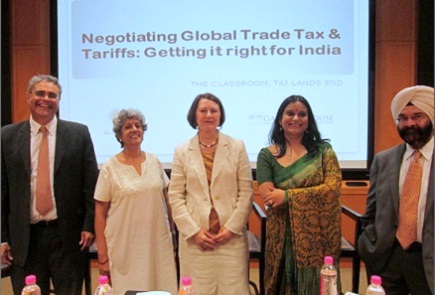
After decades of protectionist policies, India has eased its trade regulations and signed several multilateral and bilateral trade agreements. It has trade agreements and treaties on economic cooperation with neighbours such as Bhutan, Sri Lanka and Nepal and others such as Japan, Korea and the MERCOSUR countries in Latin America. It has signed a free trade agreement (FTA) with ASEAN and is in the process of negotiating one with the European Union and Canada. We have never been so economically engaged before.
But is India well prepared for these negotiations, enough to get mutually beneficial deal? Not really. While India is clear about its needs and requirements, and often articulates its position well, as it has often done at Doha, the country is woefully under-represented in human resources and subject expertise. This puts at a disadvantage over other more sophisticated developed countries, particularly when it comes to negotiating in favour of our agricultural society. In balancing economic benefits against social costs in its trade agreements as an emerging economy, what obstacles does India face and what can we bring to the table as a powerful bargaining chip? How can we develop expertise and negotiate from a position of strength? How can we use our comparative labour-cost advantage in FTAs? Where we have a negative trade balance – for instance with ASEAN – can we overcome it with a deft application of our Look East policy? Given the heterogeneity of ASEAN countries and the competition amongst them, will bilateral trade agreements serve India better than multilateral ones? Can the Doha round be revived or should India turn its attention to deriving benefits from bilateral treaties?
On October 1, Gateway House hosted Ujal Bhatia, Member of Appellate Body of the World Trade Organization (WTO); Joanna Hewitt, Commission Chair of the Australian Centre for International Agricultural Research (ACIAR), and former Lead Negotiator for Australia in the WTO; Abanti Sankaranarayanan, Managing Director, Diageo India; and Suhail Nathani co-founder partner at Economic Laws Practice, to discuss ‘Negotiating Global Trade, Tax & Tariff: Getting it right for India.’
This is the second event under ‘The Knowledge Series’ by Gateway House.
Ujal Singh Bhatia is a Member, Appellate Body, the World Trade Organization (WTO). He previously served as India’s Ambassador to the WTO from 2004-2010. From 1995-2000, he worked in the Indian Central Government as Joint Secretary in the Commerce and Industry Ministry, and dealt with a range of trade policy issues – domestic, bilateral, regional and multilateral. His experience in dealing with trade issues in India as well as in the WTO has convinced him of the need for a strong multilateral impetus for designing rules and disciplines for trade in the rapidly changing global economy.
Joanna Hewitt is Commission Chair, Australian Centre for International Agricultural Research (ACIAR). Formerly, she has served as Australia’s APEC Ambassador (1997-1999), Ambassador in Brussels (2000-2003) and Lead Negotiator for Australia in the WTO (2003-2004). Since leaving full time Government service, she has been a director on corporate boards in the U.S. and Australia, and as Special Envoy for the Australian Prime Minister on outreach and development issues in Africa. She has undertaken consultancies on trade and agriculture issues for the OECD and the International Food Policy Research Institute (IFPRI).
Abanti Sankaranarayanan is Managing Director, Diageo India, with the mandate to lead the India business’ ambitious growth plans. Previously, served as a member of the Tata Administrative Service (TAS) cadre since 1992, where she where held several key marketing roles on some of the best known consumer brands of the Tata Group, including Taj Hotels (India & the U.S), Himalayan Natural Mineral Water, Tetley (UK) and Tata Tea.
Suhail Nathani is Co-founder and Partner, Economic Laws Practice, a 10-year-old firm with four offices in India – Mumbai, Delhi, Ahmedabad and Pune. Mr. Nathani has been involved in several of the Indian trade remedial measure cases at every level – Designated Authority, Appellate Authority, the High Courts and the Supreme Court of India. On the trade advisory front, he has advised on various aspects of GATT, GATS and FTAs, including rules of origin, non-tariff barriers, trade remedial measures and market access.
Gateway House meetings are for members and special invitees only, and they are off-the-record and not-for-attribution. If you are interested in becoming a member, click here for more details.
